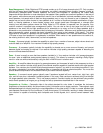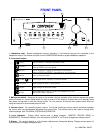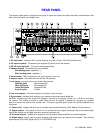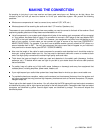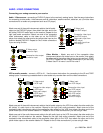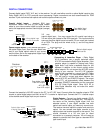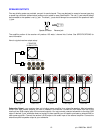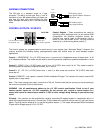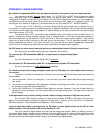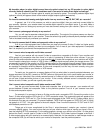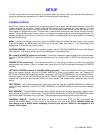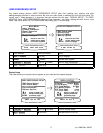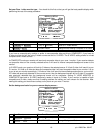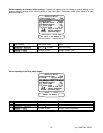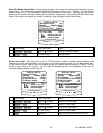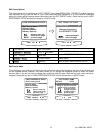
FREQUENTLY ASKED QUESTIONS
My collection of equipment differs from the labels on the back of my receiver, how can I hook them up?
Your receiver provides 5 identical sets of inputs - V1, V2, DVD, CD, and SAT. Each of these has analog
audio, composite video, S-video, coaxial digital audio, and optical digital audio. It is convenient to connect
components as labeled on the back of your receiver, but since all the inputs are identical, you can connect any
compatible source to any set of inputs. For example, you can connect a DAT player to V1 instead of a VCR. You
can program your receiver to display any 5 character name for any input (see SETUP - SOURCE NAMES).
The sixth input, TV-V3, is identical to the others except that the optical digital input is replaced by a 3.5
mm coaxial for simple connection to portable equipment or personal computers. You can also connect portables
to any other coaxial digital input using adapters or special cables. If you have a source with only optical digital
output don’t connect it to TV-V3.
The seventh input, TAPE, has analog audio, composite video and S-video, but has no digital inputs. It is
primarily intended for analog recorders such as VCRs or cassette decks. If you have a three-head cassette or
reel-to-reel tape deck you will prefer the TAPE input since it allows a full tape monitor capability. Tape monitor
allows you to listen to what is actually on the tape as you are recording it. The V2 input also provides full tape
monitor capabilities for zone 2. If you don’t use zone 2 you can use V2 as a second independent analog tape
monitor loop. V1 includes a line level output but does not provide a true tape monitor capability.
My DVD player (or other source) has both optical and coaxial digital outputs. Should I connect both?
No, connect only one digital cable per source. (See also next question.)
Do I need an AC-3 RF demodulator (B&K DT-1 or equivalent) to playback Dolby Digital
DVDs?
No, this is required only for Dolby Digital (AC-3) laserdiscs.
Do I need an AC-3 RF demodulator (B&K DT-1 or equivalent) to playback DTS laserdiscs?
No, this is required only for Dolby Digital (AC-3) laserdiscs.
Do I need to connect both analog and digital audio from my DVD player (or other digital audio source) to
the receiver?
In general, it is simpler to connect both. However, if you can meet all of the following criteria you need only
connect digital:
1. I do not use zone 2. (Zone 2 is analog only - if you use zone 2 you must connect both left and right analog to
hear audio.)
2. I do not own any old laserdiscs. (Early laserdiscs contained only analog audio tracks - you must connect both
left and right analog audio to play these back.)
3. I do not use Tape Monitor. (It is possible to tape digital-only sources. However, if you wish to listen directly to
the tape as you are recording - you must connect both left and right analog audio - the tape monitor loops are
strictly analog.)
If the tape monitor loop is strictly analog, how do I make an analog recording of a digital-only source?
Do not select TAPE. Select the source you wish to record. Select STEREO Lt Rt mode. If that source is
digital, the converted digital-to-analog will appear at the tape and V1 outputs. V2 out, like Z2 out, is analog only.
(See also Operation - Source Selection and Operation - Surround Mode.)
I want to make direct digital recordings from my CD player (or other digital source) on my DAT (or other
digital recorder). Can my receiver make this connection for me?
Yes, your receiver’s digital outputs act much like the analog tape outputs. When you select a source, if
that source has a digital connection to your receiver, then that digital signal will appear on the receiver’s coaxial
and optical digital outputs. Simply connect all of your sources digital outputs to your receivers digital inputs. You
can then connect up to two digital recorder inputs to your receiver’s two digital outputs.
14
p/n 12699 Rev. 9812C



